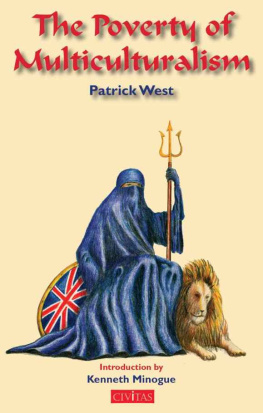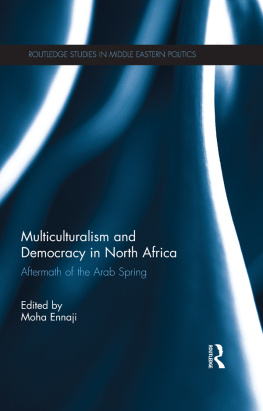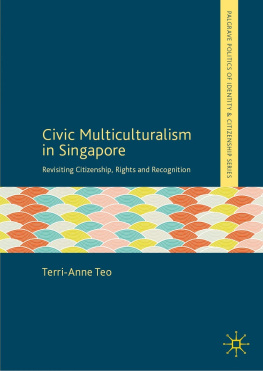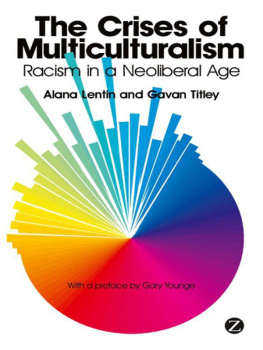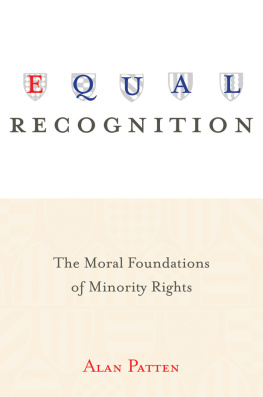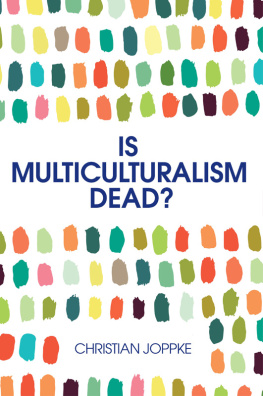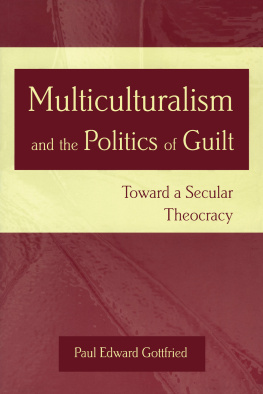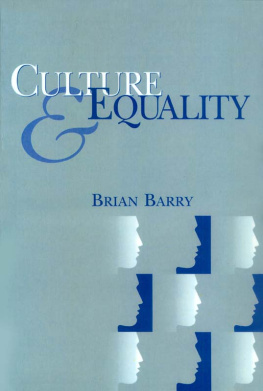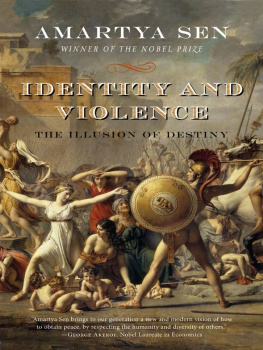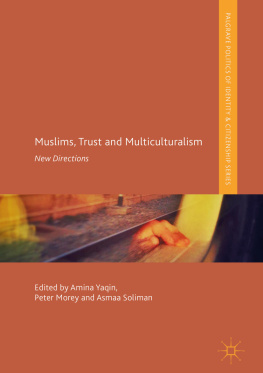
The Poverty of Multiculturalism
Patrick West
Introduction by
Kenneth Minogue
Civitas: Institute for the Study of Civil Society
London
Registered Charity No. 1085494
First Published September 2005
The Institute for the Study of Civil Society 2005
55 Tufton Street
London SW1P 3QL
Civitas is a registered charity (no. 1085494)
and a company limited by guarantee, registered in
England and Wales (no. 04023541)
Email: books@civitas.org.uk
All rights reserved
ISBN 1-903 386 46 2
Independence: The Institute for the Study of Civil Society (CIVITAS) is a registered educational charity (No. 1085494) and a company limited by guarantee (No. 04023541). CIVITAS is financed from a variety of private sources to avoid over-reliance on any single or small group of donors.
All publications are independently refereed. All the Institutes publications seek to further its objective of promoting the advancement of learning. The views expressed are those of the authors, not of the Institute.
Typeset by Civitas
Contents
Multiculturalism: A Dictatorship of Virtue
Kenneth Minogue
The Poverty of Multiculturalism
Patrick West
Authors
Patrick West was born in London in 1974 and graduated from Manchester University in 1997 with an MA in Cultural History. He has written for The Times , Daily Telegraph , New Statesman , Spectator , Times Literary Supplement , Catholic Herald and Living Marxism (LM). He is the author of Conspicuous Compassion , Civitas, 2004.
Kenneth Minogue is Emeritus Professor of Political Science in London University. He is a director of the Centre for Policy Studies (for which he has written The Egalitarian Conceit and The Constitutional Mania ) and a trustee of Civitas for which he has written Civil Society and David Blunkett . He is an Honorary Fellow of the London School of Economics. He has written The Liberal Mind (1963, new edition published by the Liberty Fund 2001), Nationalism (1967), The Concept of a University (1974), Alien Powers: The Pure Theory of Ideology (1985), Politics: A Very Short Introduction (1995), The Silencing of Society: The True Cost of the Lust for News (1997) and Waitangi: Morality and Reality (1998). He has edited several books, including most recently Essays in Conservative Realism (1996), and contributed essays to others. In his academic persona, he has lectured and visited universities and research institutes in many countries, but he has also written columns for The Times and the Times Higher Education Supplement , as well as reviewing for the Times Literary Supplement.
Acknowledgement
Thanks are due to Damian Thompson and to Ed West for helping this book to happen, and to those who participated in the refereeing process, and whose comments were so helpful.
Introduction
Multiculturalism: A Dictatorship of Virtue
Kenneth Minogue
I n the last half century, millions of Asians and Africans have migrated to Europe. This has posed considerable problems of social adjustment both for the newcomers and for the existing population. These problems are relatively minor, however, compared to something else that grew out of these migrations. I refer to the fact that the doctrine of multiculturalism has imposed nothing less than a dictatorship of virtue upon a previously free people. And this is a doctrine emanating not from migrants but from the heart of our civilisation itself. I propose to say something about both the virtue, and the dictatorship.
The virtue at first sight might seem to be tolerance, something of which the British people have had a supply no less abundant than that of any other population, and more than most. But tolerance was an old liberal virtue. In our modern world, what we might call holding your nose tolerance has been found inadequateindeed, positively insulting. The notional beneficiaries of tolerance demanded something better: namely, social acceptance. And a little further down the line has come the demand for something more: social inclusion. As the doctrine of tolerance began in the 1960s to turn into a morality of acceptance and inclusion, it also began to make claims about reality, and turned into multiculturalism, the belief that all cultures are equal in value.
The doctrine is that we must, on pain of committing discriminatory racism, regard every individual, and every culture in which individuals participate, as being equally valuable. Indeed, as the doctrine develops, we must not only share this opinion. We must regard people of all cultures with equal affection, employ them, make friends with them, promote them and include them in everything we do, in proportion to their numbers in the population. The doctrine ramifies in many waysfor example it finds intolerable the old familiar collective specialisations that come and go in human groupsGurkhas in soldiering, black pre-eminence in sport, Irishmen in the Boston police, not to mention women in the caring professions. In a multicultural society, any such responsiveness to the facts of talent and temperament must give way to a precise representativeness in every sphere of life.
You might judge that this is merely a ramshackle codification of the respect for others that is familiar to us as good manners, and familiar also as the equality of opportunity so long valued in liberal politics. You would be wrong. Multiculturalism is a doctrine about purity of the heart. Sympathy for one culture rather than another, indicates an impurity of the heart. But the disposition human beings have to prefer some things to others is so powerful that this criterion would erect as the test of virtue something that is a human impossibility. And that is just the point. For if we constantly feel a set of emotions running contrary to those we have been persuaded (on pain of racism) we ought to feel, then we become entangled in a sense of guilt. We are revealed as unworthy. And the psychological power of the doctrine is enhanced by the almost sinister indifference people have to actually defining racism. Any accusation of it seems to stick. Yet, is it a sentiment, an idea, a theory, a social policy, an action? And whichever of these things it might be, how do they connect together? Is there any difference between a reflex of antipathy to a culture, and a practice of assaulting those who belong to it? A similar indeterminacy will be found in our expanding phobia family, as in Islamophobe.
Multiculturalism, then, belongs to a family of antinomian beliefs with a long religious history behind them. The best-known examples are Puritanism and Communism. In both cases, a doctrine of the purity of the heart was advanced as transcending mere rules of right and wrong. And the result has always been to constitute an lite of the pure in heart who would, of course, need the power to reform society so that it fully shared this ideal purity. In this process of reform, Puritans became adept at sniffing out sin, or Satanism, and set about purging society of witchcraft. Bolshevik comrades experienced the fullness of proletarian solidarity, only to find that many comrades had to be purged because they could not help revealing signs of bourgeois weakness. It is the same with us in Britain. Everybody says we must celebrate the wonderful diversity of the new multicultural society coming into being, but all too many people exhibit symptoms of racism and discrimination. Racism is, of course, a motive, a movement of the heart, but the evil of racism is such that it may work even among people who are, at least consciously, pure of heart. In antinomian doctrines, there are many ways of being a sinner. This is why we have institutional racism.
Next page
